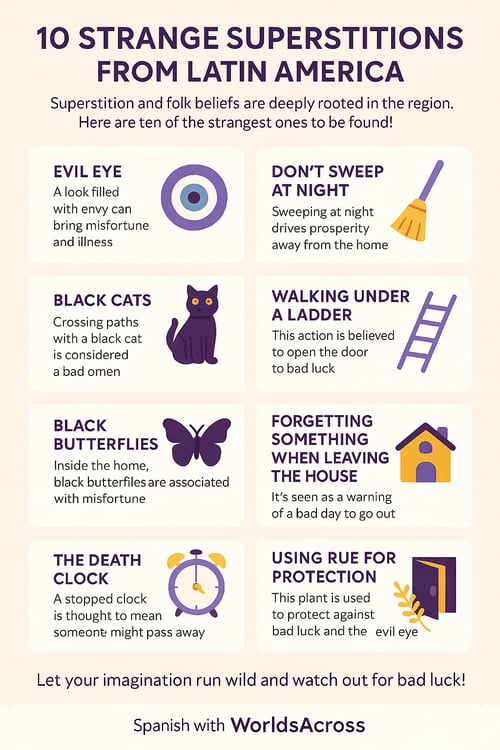10 Strange Superstitions in Latin America

The intriguing mix of the supernatural, mystery, and fear of the unknown has given rise to numerous superstitions in Latin America, leaving a deep mark on the region. What would you do if a black cat crossed your path or if your watch stopped for no apparent reason? These beliefs, which have endured over time, continue to influence the daily decisions and behavior of those who believe in them. Whether you’re a firm believer or a committed skeptic, we invite you to let your imagination run wild and join us as we explore 10 of the strangest superstitions from Latin America. Get ready!
-
Evil Eye
Almost every Latin American has heard their mother talk about the importance of protecting oneself from the dreaded evil eye. In Latin America, it's believed that a look filled with envy can cause misfortune and illness. For this reason, many people wear amulets like the Turkish eye or azabache (a black stone) known for their supposed power to protect against this negative influence. Without a doubt, the evil eye is one of the most respected folk beliefs in Latin America.
-
Don’t Sweep at Night
Sweeping in someone else's house may show respect and helpfulness, but sweeping at night in countries like Venezuela and Mexico could get you uninvited. In many Latin cultures, the night is considered a time for rest, not activity. Thus, sweeping at night is believed to drive prosperity away from the home and attract bad luck. Don’t say we didn’t warn you!
-
Black Cats
Crossing paths with a black cat is considered a bad omen in many cultures, and Latin America is no exception. This belief stems from old European superstitions where black cats were thought to be witches’ assistants—or even witches in disguise. While today many see black cats simply as pets, the superstition persists and remains deeply rooted in the region.
-
Walking Under a Ladder
When it comes to Latin American superstitions, one of the most well-known is avoiding walking under a ladder. The triangular shape created when a ladder leans against a wall is associated with the Holy Trinity. It's believed that walking through this "sacred triangle" breaks it, opening the door to bad luck.
-
Black Butterflies
Another creature with negative connotations in Latin American popular beliefs is the black butterfly. In countries like Mexico and El Salvador, the appearance of these insects inside a home is associated with death and misfortune. As a result, their presence can cause great unease among residents.

-
Forgetting Something When Leaving the House
Have you ever returned home because you forgot something important? In Latin America, it’s believed that forgetting something is fate’s way of warning you that it’s not a good day to go out. Because of this, many people cancel plans and stay home to avoid a bad day. Latin American superstitions are definitely surprising.
-
The Death Clock
In countries like Argentina and Chile, the "death clock" is one of the most fascinating and feared superstitions. It’s believed that if a clock stops for no apparent reason, it’s a sign that someone close might pass away. This belief, deeply rooted in local folklore, adds mystery and fear to clocks that suddenly stop.
-
Owls and Barn Owls
Owls and barn owls are feared in Latin American popular beliefs. It is said that if one of these animals hoots near a house at night, it foretells unfortunate news such as misery, illness, or death.
-
Using Rue for Protection
We can’t finish this list of Latin American superstitions without mentioning the iconic ruda (rue), a plant revered as a powerful protective amulet in various cultures. In many Latin American homes, it’s common to place a rue plant behind the main door to ward off negative energy. Additionally, many people carry a small sprig of rue to protect themselves from bad luck and the evil eye.
-
Don’t Leave Through the Same Door You Entered
In countries like Brazil and Peru, it’s believed that leaving through the same door you entered brings bad luck and future problems. According to the superstition, exiting through a different door helps cleanse any negative energy picked up upon entry.
Superstitions in Latin America have shown a remarkable ability to endure and influence human behavior. From the use of the Turkish eye and azabache to the fear of owls, these beliefs reveal how the supernatural and the unknown can sometimes override rational thinking. Although these superstitions may seem strange or irrational, they are a tangible testament to the lasting fascination with mystery and the unexplainable in our lives.





